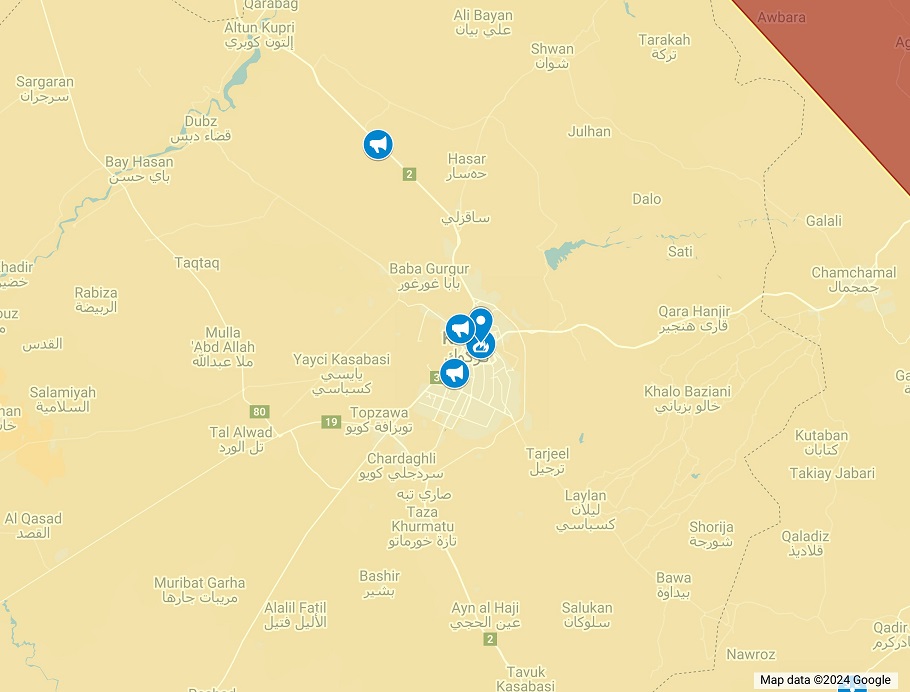1K
A biweekly brief of events and news occurred in the disputed territories.
Kirkuk
- Despite a political agreement before the formation of the Iraqi government to transfer the security responsibilities in Kirkuk from the military to the local police, the Ministry of Interior announced delays in this process until 2025. This decision applies only to Kirkuk province and the capital Baghdad. Since October 16, 2017, the Iraqi military has failed to manage Kirkuk’s security, amid increasing terrorist attacks.
- After settlers raided Kurdish farms in the Palkana village, a delegation from the Iraqi parliament, led by Deputy Speaker Shakhawan Abdullah, visited the area and met with both Arab settlers and native Kurds. According to a statement from Abdullah’s office, the meeting emphasized the need to “continue working to restore rights” to the “rightful owners” and “assess the damages” due to the tension and abuses that occurred in those areas, and to compensate those affected. On May 8, settlers attacked Kurdish farmers harvesting their lands. These farmlands had been stripped from Kurds and given to settlers by the former Iraqi regime as part of its Arabization policies in Kurdish areas. On May 22, Wasi al Asi, head of the al Obiad tribe, stated he was able to stop the vote for annulling the former Iraqi regime’s laws regarding the Kurdish lands.
- On May 19, a large fire burned 33 shops and 14 storage units in the grand bazaar of Kirkuk, known as “Khan Beroqdar.” According to initial reports from the civil defense department, a power shortage caused the fire. However, Hassan Turan, head of the Turkish-backed Turkmen Front, claimed that police had received a “warning” about plans by “outlaws” to set the market on fire. In late 2019, a fire destroyed the historical market in Kirkuk, but Turkey sponsored its renovation since the market was built during the Ottoman era.
- On May 15, the Department of Education in Kirkuk issued a rule preventing male teachers from teaching at girls’ middle and high schools and female teachers from teaching at boys’ middle and high schools across the province. The department’s orders set a three-day deadline for implementation.
- Lisa Kakie, a senior member of the Kurdistan Democratic Party (KDP) in Kirkuk, stated that her party will have a candidate for Kirkuk’s governorship. Kakie denied having agreements with other parties and reaffirmed that the governor must be Kurdish. Five months after local elections, Kirkuk’s administration is still not formed, amid divisions between Kurds, Arabs, and Turkmen.
- After connecting the gas line from Khor Mor to the Kirkuk Gas Company, the Iraqi government is set to sign a contract with Dana Gas, the operator of the field. However, the Ministry of Natural Resources of the Kurdistan Region stated that Dana Gas has a contract to supply gas for electricity in Kurdistan. Baghdad and Erbil have yet to agree on the gas field’s production as it is within Kurdistan’s territories. Separately, on May 18, Iraq’s Oil Ministry announced it had sent a technical delegation to Kirkuk’s new private refinery, describing its construction as the most important project. The refinery has the capacity to intake 12,000 oil barrels to produce gas and kerosene, and its construction is 90% complete. Recently, the Iraqi government issued seven demands to the refinery, including the production of high-quality oil derivatives.
Tuz Khurmatu
- According to a report by Kirkuk Now, only 10% of Tuz Khurmatu’s posts are allocated to Kurds after a consensus by Saladin’s provincial council. 65% of the posts were given to Shia Turkmens, while Sunni Arabs received 25% of the positions. Since October 16, 2017, thousands of Kurds have been either displaced by Iranian-backed militias or have left the district due to discrimination. The recent distribution of posts reflects that Kurds do not hold any senior positions in the district.
Shingal (Sinjar)
- On May 22, nearly one thousand Yazidis, encompassing 80 families, returned to Shingal, according to the Ministry of Displacement and Migration. These displaced Yazidis returned from camps in Duhok in the Kurdistan region. Shingal remains unstable for the return of displaced families, who took refuge in Kurdistan following the ISIS genocide in 2014.

